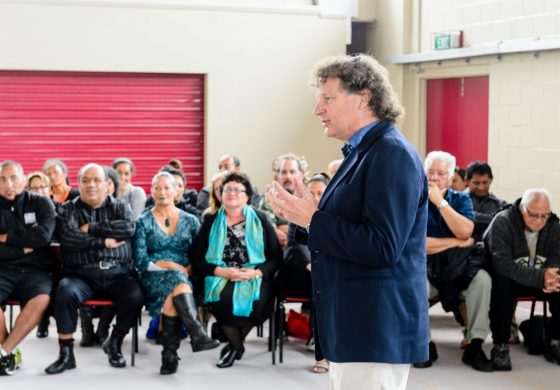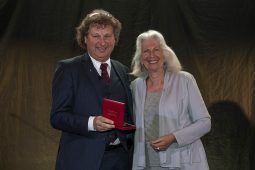News
Published 23 November 20162016 Callaghan Medal:Bringing ecological science into the marae and community

Professor Hamish Spencer FRSNZ, University of Otago, has been awarded the Callaghan Medal from the Royal Society of New Zealand for leading successful programmes of science communication and public participatory action with Uawa/Tolaga Bay and Ngai Tāmanuhiri.
The medal selection committee noted that these self-sustaining projects provide an exemplar for future public participatory partnerships in New Zealand.
The Allan Wilson Centre (AWC) began engaging with the Tolaga Bay Community in the Gisborne region during the planning stages of the 2012 celebrations of the Transit of Venus; Tolaga Bay was the place Captain James Cook made landfall in New Zealand after observing the Transit of Venus in Tahiti in 1769.
Following visits from many AWC scientists, led by Professor Spencer as the Director, a concrete plan for the transformation of the ecological and community health of the wider Uawa catchment was developed. Called the Uawanui Sustainability Project (USP), it is a partnership of local Te Aitanga-a-Hauiti iwi with schools, local farmers and multinational forest companies and includes multi-generational involvement.

Hamish Spencer is presented with Callaghan Medal by Dame Anne Salmond
The USP is self-sustaining with a local Governance Board and the chair of the board, Victor Walker, says that numerous visits from Professor Spencer and AWC staff have “normalised a scientific approach across the community”, and that the project “has pervaded every nook and cranny of our small community”.
In addition to supporting AWC involvement with the project, Professor Spencer has given numerous talks in the region and led the 2015 Bioblitz in Tolaga Bay, which has given baseline information of the region’s flora and fauna but has also led to several practical conservation modules designed for local high-school students.
External recognition has come from several sources: the project was awarded $575,000 from Ministry for the Environment’s Te Mana o Te Wai fund and won the WWF ’s 2015 Community Conservation Project Innovation Award of $25, 000. The conservation of NZ Dotterels and native bats, projects Professor Spencer advised on, also received a grant from MBIE’s Unlocking Curious Minds fund. The project won the Ministry for Environment’s 2016 Green Ribbon Award for protecting biodiversity.
The second partnership Professor Spencer has led is located in the south of Poverty Bay with Ngai Tāmanuhiri. This small iwi sought more science to be in their community and many AWC researchers were invited to Muriwai Marae to talk about their work. In addition, Ngai Tāmanuhiri wanted on-the-ground science advice about improving their land and waterways. The project was set up to be self-sustaining and has received funding from MBIE’s Vision Mātauranga Fund to continue the work.
On receiving the Callaghan Medal, Professor Spencer said: “I am delighted at the award, but it is really a recognition for the work of the whole AWC team, as well as our iwi partners. That last word is crucial: the success of both the USP and the work with Ngai Tāmanuhiri is due primarily to the development of a genuine partnership between AWC scientists and the local communities.”
Professor Spencer is based in the Department of Zoology at the University of Otago. His area of research is evolutionary theory at its applications, including population genetics and epigenetics. He is on the editorial board for journal Environmental Epigenetics and has received many honorary fellowships and visiting professor positions. He was made a Fellow of the Royal Society of New Zealand in 2009.
Callaghan Medal:
For an outstanding contribution to science communication and raising public awareness of the value of science to human progress.
Citation:
To Hamish Gordon Spencer for his work in developing and sustaining a new model of iwi and community-led science engagement, which has led to self-sustaining environmental projects and provided an exemplar for future public participatory partnerships.
